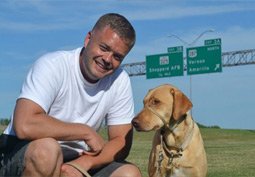By: Angel Canales
Duncanville, Texas — Here’s one pet who’s made one vet very happy. US Army Specialist and Combat Medic Dustin Deweerd was combating PTSD after his return from Afghanistan, but was able to overcome it thanks to a dog he met through an organization that pairs veterans with canine companions.
Deweerd said he didn’t want to take medication to combat his symptoms while getting treatment at a VA Hospital. “They were trying to give me pills, sleeping pills and antidepressants and I didn’t want any of that,” he said. “I wanted something more natural. I knew there were programs out there with dogs so I asked them how I could get a dog.”
That’s when he was given a pamphlet for Patriot PAWS. Created in 2006, Patriot PAWS is a service dogs organization in Rockwall, Texas specializing in training and providing service dogs at no cost for mobile or disable veterans to help restore their physical and emotional independence. Lori Stevens, the founder of Patriot Paws, launched the organization in 2005 while helping the VA in Dallas, Texas train service dogs. “The primary goal is to be there 24 hours a day, seven days a week and they are doing things for you that we take for granted each and every day,” said Stevens. The program has grown from four volunteers to 10 paid staff members to over 70 volunteers. “You play ball, Frisbee with your dog, we play get the phone, get me a bottle of water from the fridge because I can’t get up and they don’t know they’re working. They’re doing things for you every day that you and I take for granted,” Stevens said. The first time Stevens made contact with Deweerd was with his mother who talked to her about the change she’d seen in his son after returning from the war.
After spending a few days in the training facility, Deweerd was paired last year with Gunny — a very energetic and friendly Labrador. They clicked right away. Deweerd was amazed with how quickly he responded to his commands. “At Patriot Paws, they told us that the dogs can wake you up from nightmares and I was skeptical at first,” said Deweerd. “And then it happened the first night. I remember having this really intense nightmare. It would be you’re getting shot at and you’re trying to shoot back but the bullets are literally falling out of the gun. You can’t hit the enemy. They’re coming after you and there’s nothing you can do. You feel hopeless. And I wake up to him licking my feet.” Deweerd added, “It has been a lot of help. I noticed differences and people close to me as well. They say is a night and day difference is almost like he [Gunny] sucked all the anxiety, the worry, the anger I used to have and is gone. To watch him come in and give him Gunny and see the change in his life to a young man that’s smiling and talking and focusing more on the dog and less on what’s around the corner is amazing.” After leaving the Army, Deweerd said he wanted to achieve his goal of going to college. “I always wanted to learn Spanish, another language,” he said. Since his first job out of college was as a teacher, Deweerd started teaching sixth-grade bilingual education.
“I really enjoyed it. To me education is a lot like being in the military except this time I’m the platoon leader and my kids are my soldiers,” he said. Deweerd, who currently teaches fourth graders math at Duncanville Elementary school near Dallas, sometimes brings Gunny to school. “You got to have a lot of meaning when you get out of the military otherwise you can go the wrong path and for me teaching gave me some kind of meaning. I love the kids. It is like a big family,” he said. “I bring a lot of the military with me here. I have a ranking system in the class. As you get points in my class you move up in ranks and it gives them an incentive and they really like it.” In the meantime, Deweerd and Gunny continue to travel and spend a lot of time together.
“Gunny is my everything and he is my baby and my best friend. I think service dogs are amazing,” he said. “They’re a natural form of medicine and they bring a ton of joy to your life and help you rehabilitate. If more vets had service dogs, I think it would help a lot of vets out there in need.”
Second Tour is an ABC News digital series profiling the lives of military veterans who are doing unique things in the civilian world. For more stories, click here. ABC News video editor Arthur Niemynski contributed to this report.



